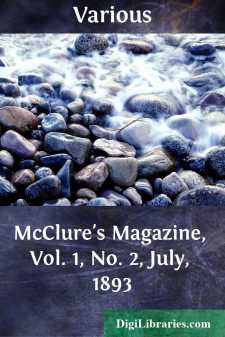Categories
- Antiques & Collectibles 13
- Architecture 36
- Art 48
- Bibles 22
- Biography & Autobiography 813
- Body, Mind & Spirit 142
- Business & Economics 28
- Children's Books 14
- Children's Fiction 11
- Computers 4
- Cooking 94
- Crafts & Hobbies 4
- Drama 346
- Education 46
- Family & Relationships 57
- Fiction 11829
- Games 19
- Gardening 17
- Health & Fitness 34
- History 1377
- House & Home 1
- Humor 147
- Juvenile Fiction 1873
- Juvenile Nonfiction 202
- Language Arts & Disciplines 88
- Law 16
- Literary Collections 686
- Literary Criticism 179
- Mathematics 13
- Medical 41
- Music 40
- Nature 179
- Non-Classifiable 1768
- Performing Arts 7
- Periodicals 1453
- Philosophy 64
- Photography 2
- Poetry 896
- Political Science 203
- Psychology 42
- Reference 154
- Religion 513
- Science 126
- Self-Help 84
- Social Science 81
- Sports & Recreation 34
- Study Aids 3
- Technology & Engineering 59
- Transportation 23
- Travel 463
- True Crime 29
McClure's Magazine, Vol. 1, No. 2, July, 1893
by: Various
Categories:
Description:
Excerpt
But I had known all about him before that. As little boys, we had by heart, in those days, the song which saved “Old Ironsides” from destruction. That was the pet name of the frigate “Constitution,” which was a pet Boston ship, because she had been built at a Boston shipyard, had been sailed with Yankee crews, and, more than once, had brought her prizes into Boston Harbor.
We used to spout at school:
“Nail to the mast her holy flag,
Spread every threadbare sail,
And give her to the god of storms,
The lightning and the gale!”
Ah me! There had been a Phi Beta anniversary not long before, where Holmes had delivered a poem. You may read “Poetry, a Metrical Essay,” in the volumes now. But you will look in vain for the covert allusions to Julia and Susan and Elizabeth and the rest, which, to those who knew, meant the choicest belles of our little company. Have the queens of to-day any such honors?
Nobody is more accessible than Doctor Holmes. I doubt if any doorbell in Boston is more rung than his. And nowhere is the visitor made more kindly at home. His own work-room takes in all the width of a large house in Beacon Street; a wide window commands the sweep of the mouth of Charles River; in summer the gulls are hovering above it, in winter you may see them chaffing together on bits of floating ice, which is on its way to the sea. Across that water, by stealthy rowing, the boats of the English squadron carried the men who were to die at Concord the next day, at Concord Bridge. Beyond is Bunker Hill Monument; and just this side of the monument Paul Revere crossed the same river to say that that English army was coming.
O. W. HOLMES’S BIRTH-PLACE AT CAMBRIDGE, MASS., ERECTED IN 1725, A.D. FROM PHOTO BY WILFRID A. FRENCH.
For me, I had to deliver on Emerson’s ninetieth birthday an address on my memories of him and his life. Holmes used to meet him, from college days down, in a thousand ways, and has written a charming memoir of his life. I went round there one day, therefore, to ask some questions, which might put my own memories of Emerson in better light, and afterwards I obtained his leave to make this sketch of the talk of half an hour. When we think of it here, if we ever fall to talking about such things, every one would say that Holmes is the best talker we have or know. But when you are with him, you do not think whether he is or is not. You are under the spell of his kindness and genius. Still no minute passes in which you do not say to yourself: “I hope I shall remember those very words always.”
GARDEN DOOR OF THE CAMBRIDGE HOUSE.
Thinking of it after I come home, I am reminded of the flow and fun of the Autocrat. But you never say so to yourself when you are sitting in his room.
I had arranged with my friend Mr. Sample that he should carry his camera to the house, and it was in gaps in this very conversation that the picture of both of us was taken. I told Doctor Holmes how pleased I was at this chance of going to posterity under his escort.
I told him of the paper on Emerson which I had in hand, and thanked him, as well as I could, in a few words, for his really marvellous study of Emerson in the series of American authors. I said I really wanted to bring him my paper to read. What I was trying to do, was to show that the great idealist was always in touch with his time, and eager to know what, at the moment, were the real facts of American life....












